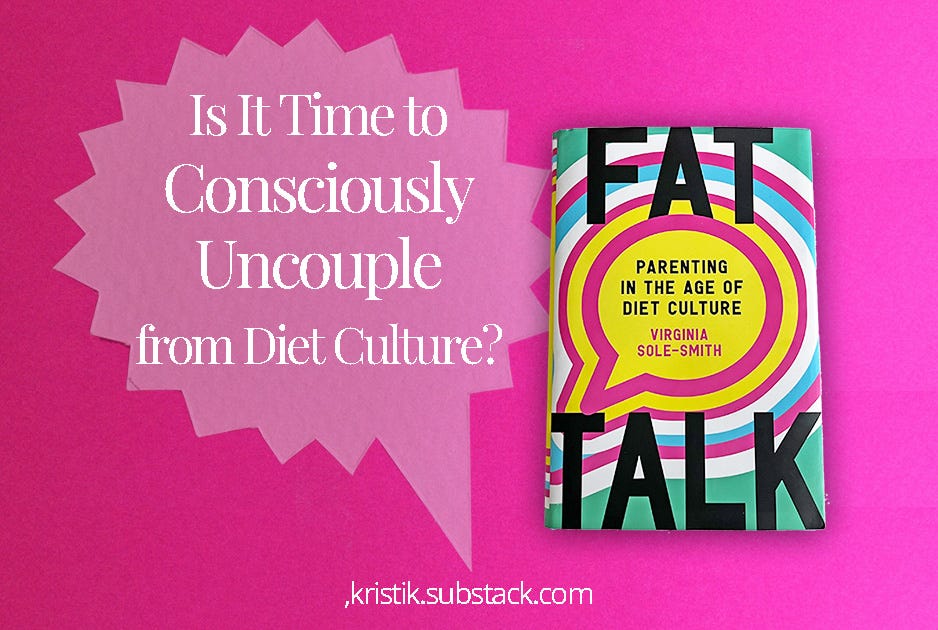A deep dive into Virginia Sole-Smith's 'Fat Talk'
The author makes a compelling case for how anti-bias is harming our kids.
I’m deviating a bit from my standard essay this week to discuss “FAT TALK.” Okay, yes, my weekly topic is often…fat talk. But this week I am talking about Virginia Sole-Smith’s book by the same name that was released April 25, 2023. Sole-Smith writes the Burnt Toast newsletter here on Substack. Full disclosure: While I purchased the digital version of “FAT TALK,“ Macmillan Publishing Group provided me with a copy of the hardcover for review. And in an odd coincidence, my daughter’s doctor is one of Sole-Smith’s sources quoted in the book.
With its bold title and even bolder cover, “FAT TALK: Parenting in the Age and Diet Culture“ is meant to grab our attention. And it does. From the very beginning, Sole-Smith lays out her argument that our preoccupation with not letting our children get fat is doing more harm than good. (The word fat is used throughout Sole-Smith’s book as “a neutral descriptor, like hair color or height,” and will be used here too.) “Our kids’ weight has become a measure of their current and future health and happiness, as well as our own success or failure as parents,” she writes.
She backs up that claim with dozens of interviews with parents, children, doctors, dietitians, scientists, and policymakers. Along with them, she deftly weaves in first-person narrative (she’s the mother of two young girls), anecdotes, and published research. The book is well-paced, interesting, and illuminating.
At its core, “FAT TALK“ is meant to inform and influence parents—all parents—not just those with fat kids. It’s also meant to be a tool and resource for parents who want to raise healthy, happy kids, who aren’t judged for their body size. That last part, Sole-Smith argues, requires parents to check their own anti-fat biases and judgments, and get a little uncomfortable. “It sounds counterintuitive, but one of the most important things parents can do to benefit their children’s health is to take weight out of every health-related conversation,” she writes.
Sole-Smith explores how decades of anti-fat bias, led by the medical community, created the present-day “obesity public health crisis,” carefully uncoupling fat and health, and explains how that bias harms, not only the health of fat people, but kids of all sizes. She outlines all the ways our society’s obsession with thinness and anti-fatness are harming our children, how anti-fat bias intersects with racism and misogyny, and how diet culture shows up distinctly for moms and dads and infiltrates family life. For parents who struggle to understand what their children think, feel, or experience as it relates to body size, weight stigma, weight discrimination, or simply the pressure to be thin, “FAT TALK“ provides much-needed insight.
What hit me the hardest in reading “FAT TALK“ is understanding just how much responsibility we mothers bear—and how much pressure we face—in making sure our children are healthy, or at least appear healthy. Right now, this means making sure they aren’t fat, but they can’t be too thin, either. This pressure and responsibility is a theme that runs throughout the book and gets its own chapter (“The ‘Nervy Mothers’ Myth”). Mothers carry the bulk of the household “mental load,” all the behind-the-scenes tasks such as grocery shopping, signing kids up for sports or dance classes, choosing pediatricians, and making appointments—work that is “both essential and yet so invisible.” They also have a powerful role in planning and preparing most meals, and by extension “assuming responsibility for your family’s nutrition, and that almost always means some level of participation in diet culture.”
She argues that mothers impact and in some ways create our children’s body image and their foundational relationship with food. What we say and do as mothers matters. A lot.
Throughout the book are lessons for all parents, but the lessons don’t feel prescriptive. Mostly, she’s asking parents to consider a different viewpoint than the one we’ve been force fed amid our “childhood obesity epidemic.” Instead of viewing fatness as the enemy, a problem to be solved at all costs, Sole-Smith nudges us to consider changing our perspective and help shift the conversation around weight, health, and self-worth. She’s asking parents to imagine what “healthy eating” might look like if the primary goal wasn’t thinness.
“We cannot will ourselves to stop hating our bodies by magic if we’ve spent decades learning to do that in a dieting-obsessed, fat-phobic culture,” she writes. “We may also not be ready to stop dieting or pursuing thinness for ourselves. But if we can recognize how harmful these activities can be for our kids, we may be able to insulate them from our own struggles by making a concerted effort to have a different conversation.”
It would be easy to get overwhelmed and perhaps even depressed by reading the myriad ways we’re screwing up our kids and their relationship with food and their bodies, and how other kids are screwing up our kids, and how our doctors and teachers and coaches are screwing up our kids, but the book is sprinkled with hope and suggestions on how to address some of these issues. By no means is Sole-Smith suggesting she has all the answers.
While the subject matter is heavy, the reading is not. For all their struggles, the parents and experts interviewed in “FAT TALK“ are genuinely struggling to do the best they can for kids. Most parents will find “FAT TALK“ both accessible and relatable. After all, most of us are just trying to get it right.
“FAT TALK: Parenting in the Age of Diet Culture” by Virginia Sole-Smith
Release Date: April 25, 2023
Thanks for reading Almost Sated. Right now, I’m working to get this newsletter into the hands of people who need it. If you found what you read interesting, encouraging, or helpful, please subscribe and consider sharing it with others.



